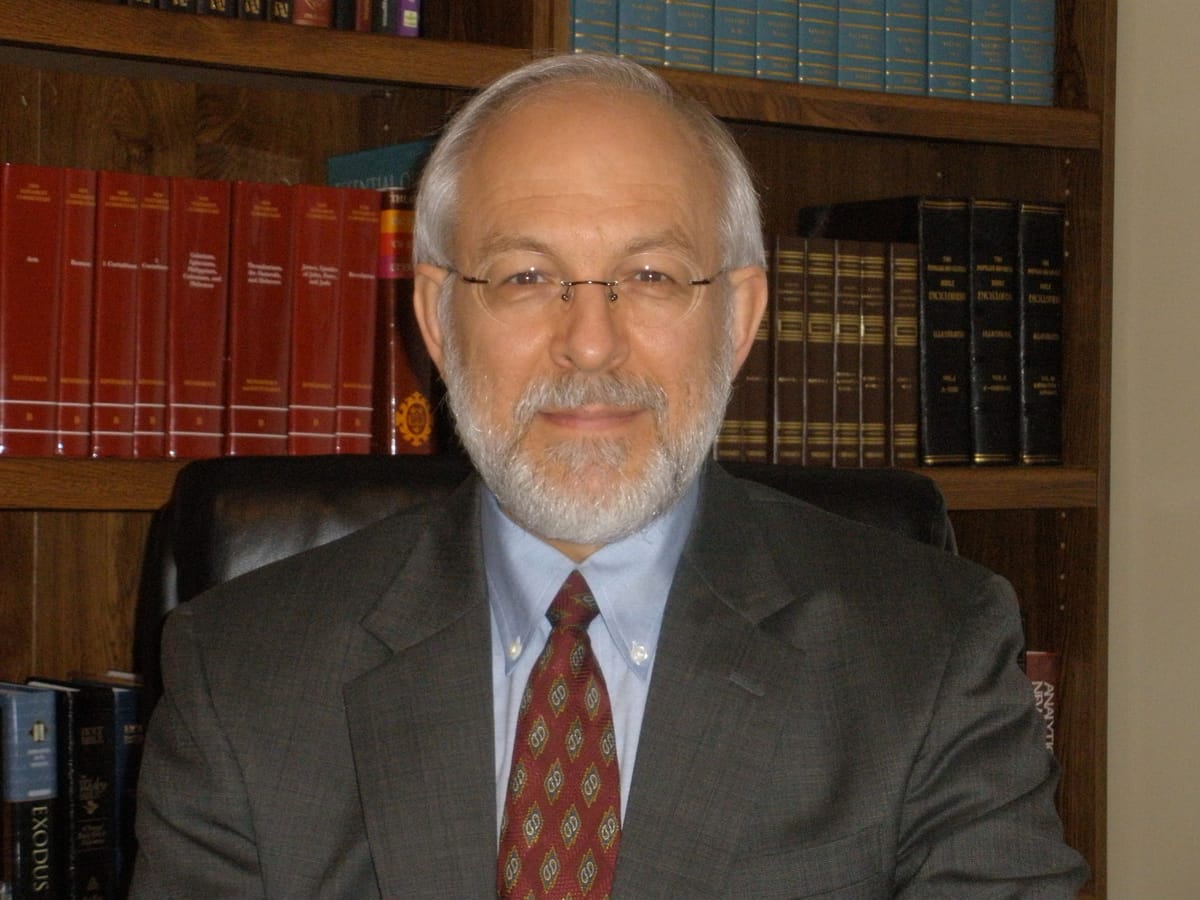Note by Dr. Bruggeman: The following essay comprises the highlights of a sermon presented by Pastor John Lovell in August 1953. Pastor Lovell (1907-1974) was the founder of First Covenant Church in Irving, Texas and of their publication, Kingdom Digest (KD), which has ceased publication. From our library collection of KDs, we found this sermon published in the Kingdom Digest in February 1983.

We find it to be chuck full of practical tips on how to further our spiritual quest for being in the high calling of the overcomer group. And therefore, we also find it to be a most appropriate follow-up to our series on jubilee forgiveness. Be blessed!
For this address we have chosen as our text the following: Matt. 5:48: “Be ye therefore perfect, even as your Father which is in heaven is perfect.” In this text the word “perfect” is not used in the sense of Divine perfection as God practices it; instead, the word implies full development, growth into maturity of godliness.
In this passage the Father’s kindness — not His sinlessness — is the point in question. So, if we are to be perfect, we must grow in grace and knowledge. To do this we must exercise will power; we must study the Word of God; we must overcome evil and temptation and practice righteousness.
There are three orders or grades in regard to the future Kingdom and the people who will serve Christ, the King, in this Kingdom on Earth. True, there are many different positions symbolized by the various crowns mentioned by the Apostle Paul.
However, it is these particular categories we have in mind in this message which we are about to mention: kings, priests, and sons of God. To qualify in the Overcomers’ group, or to be in the High Calling, one must be thoroughly consecrated to attain the position of king, priest or son in the next age.
There is a notion prevalent among Christians that just so we are saved, nothing else matters, for, being saved, we will have as much position, honor, trust and responsibility in God’s divine government on earth during the Kingdom age as anyone else will have.
Nothing could be further from the truth than such an idea. First of all, let us emphasize clearly that our position in the Kingdom does not depend upon our salvation, or, to turn the matter around, just simply being saved doesn’t guarantee us a reward in the Kingdom Age, nor do we have to work in order to be saved; our salvation is a gift.
It is accomplished by faith through the shed blood of Christ as atonement for our sin. It is tragic how little the average Christian understands about the next age and what he must do to qualify for a position of trust, honor and responsibility.
Due to people’s lack of understanding concerning this matter, we find that there is a great amount of ignorance among Christians dealing with the matter of rewards and the next age, and the few who do understand such matters apparently have no ambition to attain to a position of leadership in the Kingdom of God, while some few who have had such ambition, because of worldly cares, have fallen out of the race and are no longer trying to qualify.
Surely it isn’t wrong to seek for such a position, for Paul urges us to strive for the mastery for the High Calling and for one or more of the five crowns symbolizing our rewards in the age to come, which are offered in his writings.
The Bible truth concerning this is simply if we, in this life, as Christians, don’t suffer on account of Christ, then we have no hope whatsoever of reigning with Christ in the New Age to come. Mind you, if we are saved, we will be in His Kingdom, but we will have no inheritance.
II Timothy 2:12: “If we suffer, we shall also reign with him: if we deny him, he also will deny us”. To suffer, as mentioned in this verse, is simply to do right when otherwise we are tempted to do wrong. It means to take the path of hardest resistance rather than that of least resistance. It means that we are to discipline our minds, spirits, crucifying our passions, tongues, tempers, appetites and desires; taking up Christ’s cross, we are to follow Him.
If, then, we really aspire to a place of leadership in Christ’s Kingdom, among many other things, we must do the following if we are to attain the perfection mentioned in the text of this address:
(a) Careful Communications. Matt. 5:37: “But let your communication be, Yea, yea; Nay, nay: for whatsoever is more than these cometh of evil.” This verse seems to be a puzzle to many people. It should not be. This really doesn’t have reference to taking God’s name in vain, but, rather, to swearing, or corrupt communication.
We have all been taught not to take God’s name in vain, and, of course, we know by now that God’s name is Jesus. Of course, He has many titles, but, according to Old Testament prophecy, Jesus was to redeem Israel, but He was to be God manifested in the flesh, in human form.
Perhaps no one reading this message would think of taking God’s name in vain, but are we equally as careful about obeying the principle outlined in the above verse of scripture concerning our daily communications? This verse certainly does not suggest that you are to sit around with your lips zipped, never saying a word, or, at most, saying only literally and actually what this verse suggests. Life would be dull indeed if this were the case!
To us this verse suggests the following: that we are not to talk too much. Some people are eternal clatterers in that they clatter continually. In so doing, they will often be tactless, saying the wrong things, offending people, and many such people wonder why they don’t ever learn anything. How could they, when they talk so constantly they don’t give anyone else a chance to talk to them?
Such people wonder why the Lord doesn’t speak to them. How could He, when they continually talk? The Lord says, “Be still, and know that I am God.” Again, “In quietness shall be your confidence.” Too, this text suggests that we are not to use a lot of slang or by-words which are in such usage today among even church people.
Again, it suggests that we are to be careful about the matter of gossiping, which is usually unnecessary and rarely ever honors God or blesses mankind. Some feel that certain religious experiences may perhaps place one in such a spiritual position that he would never have temptations along this line, and yet, we have talked to some mighty good Spirit-filled men who tell us regardless of their experiences they are overcome in this matter.
Paul certainly was Spirit-filled and consecrated, yet he declared he had temptations daily and that in order to overcome, he declares: “I die daily”. Do you?
(b) Resist not evil. Matt. 5:39: “But I say unto you, that ye resist not evil: but whosoever shall smite thee on thy right cheek, turn to him the other also. “This verse has certainly been the object of much laughter and jesting, both from the pulpit and the pew.
The general attitude is: yes, I turned the other cheek; the Lord didn’t tell me what to do after this, so I just let him have it right in the nose! This certainly isn’t what the Lord is trying to teach us in the principle mentioned in this verse. If you take a light bulb out of a socket and put your finger in, instead, what happens? You get shocked. If you are not careful, you will be injured, perhaps killed. Why? Because you resisted electricity! So it is when we try to resist evil. We will get into serious trouble if we are not careful.
Instead of resisting evil, the Lord says overcome evil with good. People certainly go at this matter of reformation and the giving up of evil in the wrong manner. If a man’s wife is untrue to him, instead of his being kind, loving and forgiving, inspiring her to give up sin, he declares, “Well, two can play at this game”, and meets her actions with his own actions of infidelity. This is not what the Lord taught in this verse.
Others in such matters declare, “I will give just as good as he sends”. This is not overcoming evil with good! People try to give up smoking by tapering off. One man told me he tried to give up liquor by carrying a bottle on his person, just to smell anytime he was tempted. Though it is possible to overcome evil in this manner, seldom will one have the victory using such methods.
Knowing my own weaknesses more than anyone else, I try to overcome my weaknesses by putting into operation good principles. For instance, as a purely personal comment, I could be jealous concerning my publication, my local congregation. Knowing that tendency is there, and realizing how many ministers give way to the temptation to be jealous, when a visiting minister is coming my way, I urge my people for two or three Sundays to be sure to be present to grip the hand of the visiting minister, to tell him how much he is loved and appreciated.
Furthermore, instead of asking the visiting minister to stay at the front as I dismiss the people, for fear someone may shake hands with him, I always have my guest speakers go to the door with me before the benediction, and urge every person to shake hands with him. In doing this, any temptation I might have to be jealous is completely eliminated before the matter even has to be dealt with.
Likewise, in our publication, instead of trying to write virtually all that is in there myself, I try to see how many different writers’ articles I can use each month, and it gives me great pleasure to have subscribers speak highly of other people’s articles. So, may we suggest that this principle be employed in your trying to overcome evil.
(c) Love and bless your enemy. Matt. 5:44 (a): “But I say unto you, Love your enemies, bless them that curse you, do good to them that hate you.” There is no reward for people who are simply good to those who are good to them and who love them. Anyone can do this, even animals.
Your reward comes only when you love and bless those that are hateful and mean towards you and when you do good to them that have mistreated, persecuted and opposed you. Let us follow the example of Christ in this matter, Who provided salvation for His enemies, reconciliation for those who sent Him to the Cross, and redemption for Israel, who mistreated her Husband so shamefully.
(d) Pray for your enemies. Matt. 5:44 (b): “And pray for them which despitefully use you, and persecute you.” Your character is revealed by the praying you do in private, when you know no one is listening. It would be a blessing if you could have a tape recording of each prayer you pray in the secret place. Most of our prayers, we are afraid, are taken up with “Give me, give me, give me.”
Instead, we should spend much of our prayer time praising the Lord and a good portion of it in praying for our enemies and actually forgiving and loving them. Christ on the Cross, during the last moments of His life, before He voluntarily gave up His Spirit, set the supreme example when, looking at those who had nailed Him to the Cross, instead of hating them, with humility, compassion and love, He said, “Forgive them: they know not what they do.” Go thou and do likewise!
~END~




